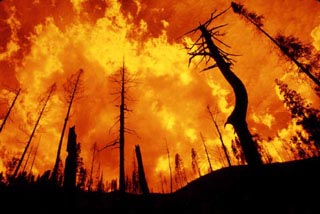Portugal burns
Forest fires in Portugal typical of a malaise with an easy solution. Russian offer ignored, as usual

Portugal is burning from north to south, from east to west. Last weekend, there were over 400 forest fires up and down the country, adding vast tracts of charred land to those already destroyed in recent years. A trip from Lisbon to Oporto reveals a blackened, barren glimpse of Armageddon with devastation visible almost along the entire journey.
The figures speak for themselves: 108 arson suspects detained this year, 26.293 fires since January 1st, 419 of them on Saturday, 57 being classified as serious. At the weekend, 3.401 firemen were deployed with 956 vehicles and 34 aircraft. This is, has been and continues to be, a major operation.
Causes
Tinder-dry conditions after the worst drought in living memory in most of the country, coupled with the fact that the summer holidays see expeditions of schoolboys walking in forests, family cars driving around the countryside with windows open and the habit of tossing the lighted cigarette out of the window, the barbecue in the open air, contribute towards a small number of fires, caused through carelessness.
However the vast majority are caused by arsonists (hence the more that 100 people already detained) and more sinisterly, the fire-fighters themselves. Many are the cases of eye-witnesses presenting reports to the police of fire-fighting aircraft dropping incendiary bombs in forests to guarantee work which will pay the bills for the rest of the year. Not always do these cases reach the courts. A tiny percentage of Portugal's fire-fighting aircraft are state-owned.
92% of Portugal's forests are privately-owned, many of these poorly cared for and not cleaned, full of dry wood and pine needles, waiting for the spark to ignite the fire.
A further cause is an apparent absence of government legislation to deal with the problem for the last 15 years, raising eyebrows and giving rise to rumours that the political parties in power during these years (PS, PSD; CDS/PP) are in some way connected to lobbies interested in the event, or else, and more depressingly, are totally inept at government.
Solutions
There are basic internal solutions and international solutions which could be applied. Given that in many cases the Portuguese fire services have been so stretched that the local populations were forced to fight the fires themselves, it is evident that despite many claims by the former conservative government (PSD/CDS/PP) and the present one (PS, Socialists), Portugal does not have the potential to combat its forest fires effectively. It suffices to mention that 2005 was the second worst year in the last 15, after 2003, in terms of hectares burnt - some 200,000 according to some experts.
Internal solutions would be to nationalize the aerial firefighting equipment, to guarantee that fortuitous sorties would not create commercial conditions hazardous to the public health, to force the owners of forests to keep them in minimum conditions (as the owner of a Rottweiler has to keep his animal on a muzzle), draconian measures to punish those identified as being responsible for fires (such as a minimum of 25 years in jail) and surveillance equipment being set up in and near forests.
Russian offer ignored
Externally, as usual, the Russian offer of fire-fighting equipment for Europe (and North America) has been ignored. In July, Nikolai Kovalev, Service Director of the Russian Ministry of Natural Resources, stated that Russia had "serious concern about forest fires raging in European countries", adding that the Russians were "ready to offer assistance to those countries".
Russiaґs vast experience of forestry management goes virtually ignored in the western world, despite the fact that every year Russia offers its assistance. For example, again in 2005, Valery Roshchupin, Director of the Federal Forestry agency (Rosleskhos) stated that the fires in Portugal and other EU countries are similar in nature to those in Russia.
Russia has specialized firefighting equipment certified to work abroad. Among this equipment is the king of firefighting aircraft, the Waterbomber, otherwise known as the Ilyushin-76TD, or IL-76.
Any search on the Internet will reveal that the payload of this aircraft is up to five times that of its nearest rivals, it is cheaper, needs a shorter runway. In short, it has only advantages. And the reason why it is not used? Simple. It is Russian. Vested interests mean that the lobbies prefer people to burn to death than to deploy the best and cheapest equipment to do the job.
The simple reality is that.
Subscribe to Pravda.Ru Telegram channel, Facebook, RSS!


